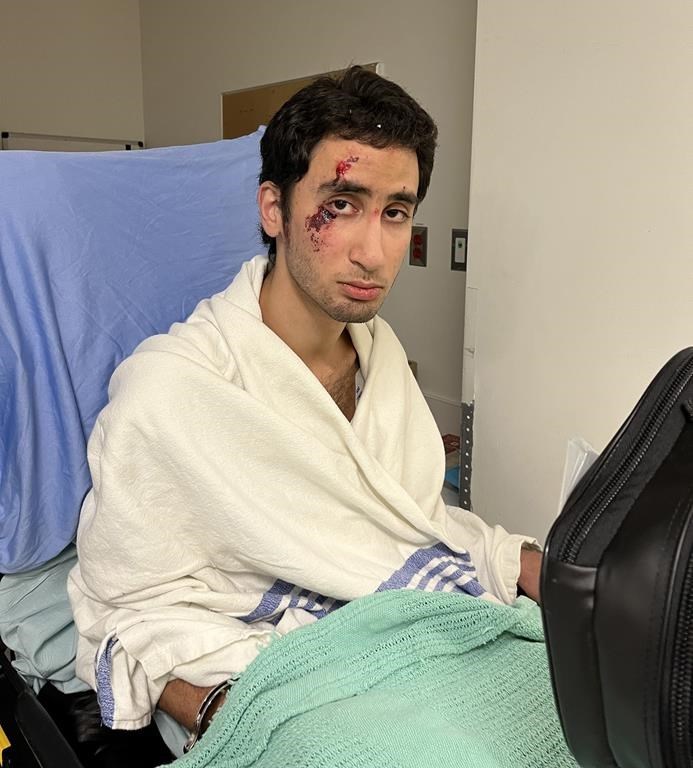When Majd Darwich heard the sound of police sirens speeding past his home in Mississauga, Ont., last week, he instinctively ran upstairs to check if his nonverbal autistic son was still in his room.
His 19-year-old wasn't there.
As soon as Darwich saw his front door standing open, he knew his son had left home and might be in trouble.
Darwich immediately jumped in his car but only had to drive past a few houses before coming across what he described as a terrifying scene.
Hi son, Abdullah Darwich, lay on the ground wearing only shorts and police handcuffs. About a dozen Peel Region police officers stood around the teen, Majd Darwich said, noting his son's face was covered in blood.
"This is a sick boy," he recalled screaming at officers. "What are you doing?"
"I felt like I will have a heart attack," he said. "I was trying to reach him ... and they prevented me even to hug him.”
Peel Regional Police said they had used a stun gun on Abdullah Darwich after responding to a report about a "suspicious person" allegedly trying to enter a vehicle and a house while undressed. Police said they were unable to communicate clearly with the teen.
Majd Darwich said the encounter with police last Friday required his son to get treated in hospital for injuries that included bruises on his body and cuts on his face.
Darwich said he's speaking out about what happened to his son because he wants to see a change in how police interact with those with autism.
"Autistic children are part of our community, and they have the right to live in a peace(ful) environment," he said. "It is not fair that I cannot let him step out of the house because he is autistic."
Peel police said Abdullah Darwich wasn't responding to them when they arrived at the scene.
"At the time of the incident, the identity and the condition of the individual was unknown to the officers," the force wrote in a statement.
"The individual was apprehended and taken to a hospital to receive medical attention and support following the use of a conductive energy weapon."
Police added that officers with a unit that connects residents with community resources later visited the Darwich home to "offer support."
Majd Darwich said his son slipped out of the house around 6 p.m. that evening clad just in shorts and speculated that the teen may have tried to climb into a neighbour's car while seeking warmth.
He noted that he had added his son to the Peel Police Vulnerable Persons registry to prevent such confrontations with law enforcement – police did not respond to questions on whether they had used the system at the time.
While his son is now physically recovering, his mental state is fragile, said Darwich, who is considering legal action against police.
"When he sees a stranger, he starts to shout and runs to his room and puts his blanket on his head," Darwich said of his son. "He is very traumatized now."
Autism Canada said what happened to the Darwich family was preventable.
"Events like these, happening all across Canada, emphasize the importance of mandatory training for all first responders when dealing with autistic individuals," the organization wrote.
"Equally important is that the situation may not have occurred if neighbours everywhere were educated about autism, exposed to a broader view of autistic experiences and accepting of all differences."
The Darwich family's situation isn't an isolated one.
In Alberta, the province's Serious Incident Response Team is investigating the arrest of an autistic teen by St. Abbert RCMP. Police had received a report about a "younger man" with "some severe handicap" or "possibly on drugs" on Oct. 2 in Edmonton.
Erick Laming, an assistant professor of criminology at Trent University in Peterborough, Ont., said a number of police services now have training on how to respond in situations involving people with mental health issues, neurodevelopmental disabilities and autism. But there's "no provincewide mandate requiring officers to complete additional training on these areas," he said.
Laming said that while it's hard to fully analyze what happened with the limited information available, it appeared Peel police could have handled matters differently.
"It seems that the use of force could have been prevented with proper de-escalation and situational awareness strategies," he said.
"The injuries that Abdullah received are certainly troubling and highlight serious concerns in interactions between police and community members with developmental disabilities."
This report by The Canadian Press was first published Nov. 11, 2022.
Sharif Hassan, The Canadian Press



